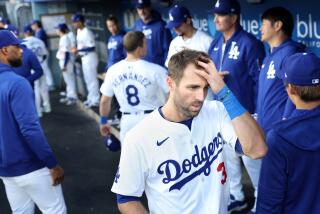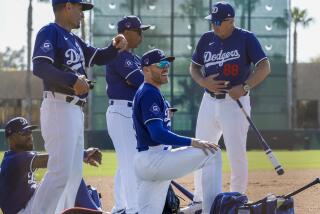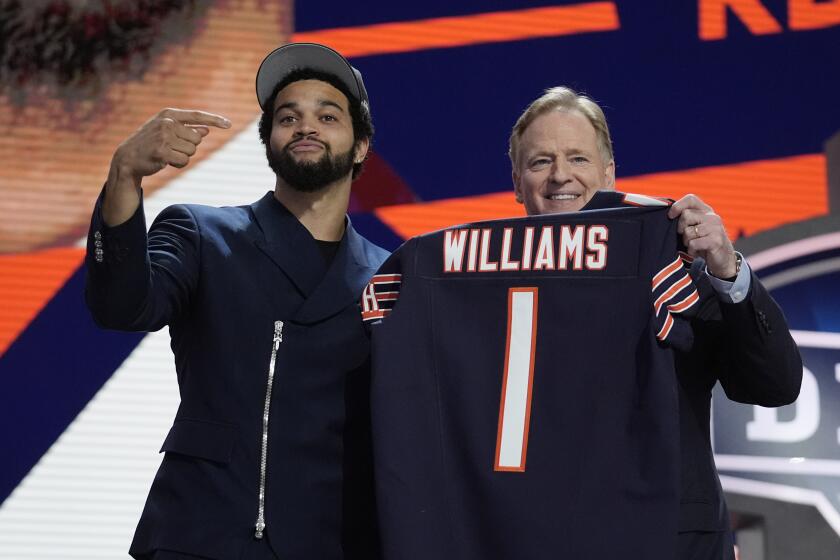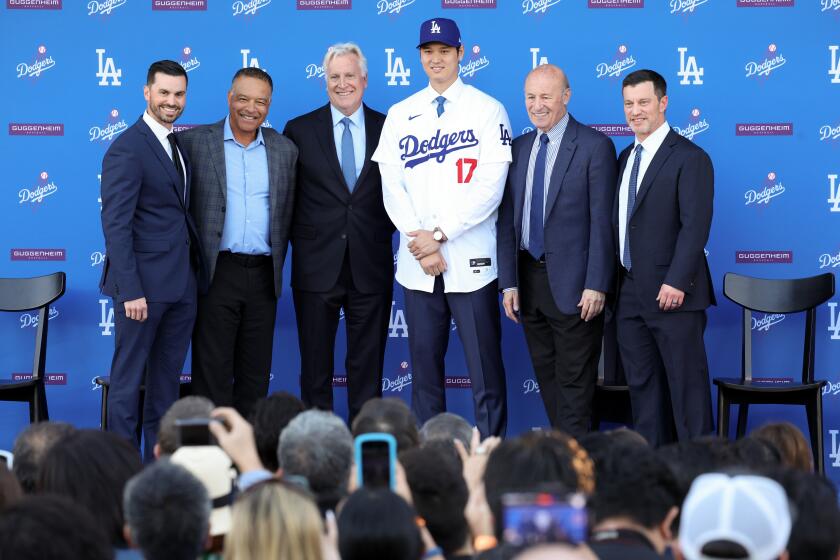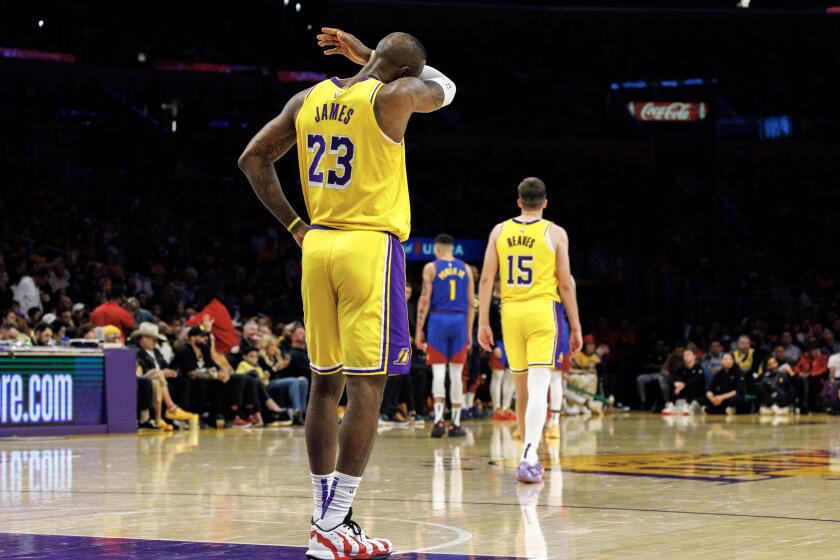Column: Dodgers’ front office remains tone deaf on what went wrong
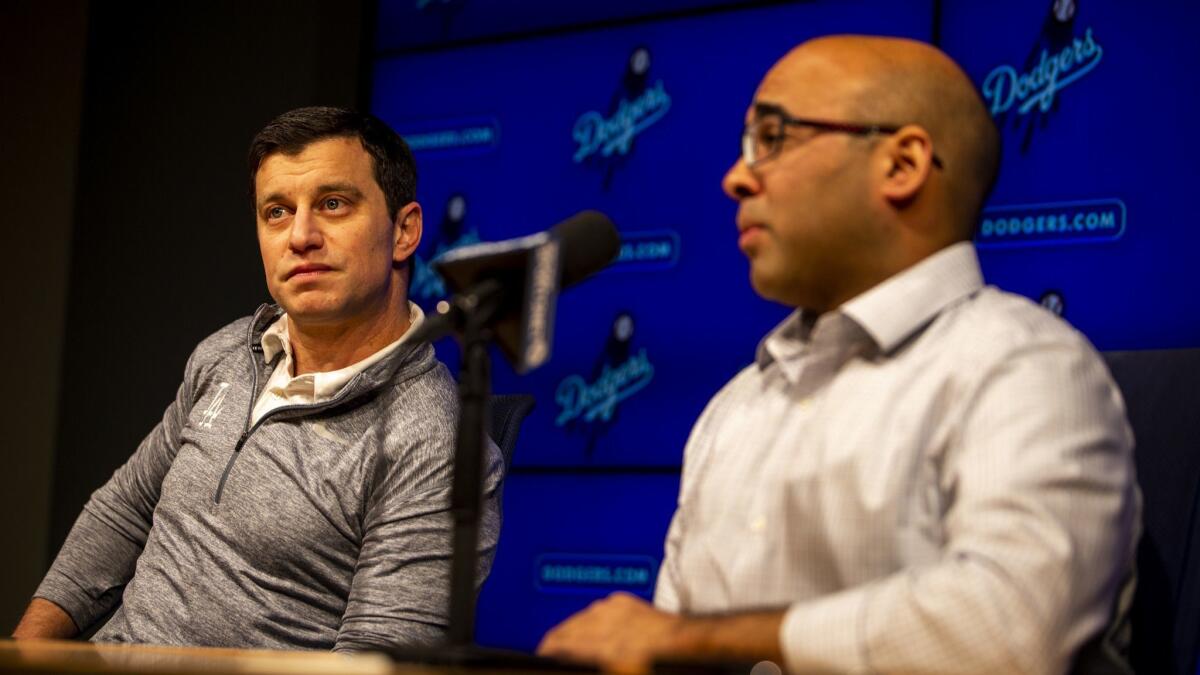
When conducting a postmortem on a failed ending to a season, chastened sports executives ordinarily tell fans exactly what they want to hear.
As usual, Andrew Friedman and Farhan Zaidi did just the opposite.
During a news conference Thursday in the wake of a second consecutive World Series disappointment, the Dodgers’ top baseball executives smiled and said all the not-quite-right things.
You wanted them to acknowledge that the analytics-fueled philosophy that works so well during a six-month regular season may need tweaking during a short series against an elite team?
They wouldn’t.
“So it works for regular season, works for [division series], works for the [championship series], but then in the World Series, it’s a failure?” asked Friedman, the Dodgers’ president of baseball operations. “I don’t know how to answer that question, I really don’t.”
You wanted them to admit that, as an example of overreliance on numbers, they perhaps should not have become the first team in baseball history to rest their top four home-run hitters in the first two games of the World Series because of matchups?
They wouldn’t.
“When those guys were going to the bench, they weren’t being supplanted by typical bench players,’’ said Zaidi, the Dodgers’ general manager. “We had guys like Brian Dozier and Matt Kemp and David Freese.”
You wanted them to confirm that they really should have acquired another high-priced bullpen arm to take the pressure off a struggling Kenley Jansen, thus reducing the need for high-leverage innings from journeyman like Ryan Madson.
Nope.
“Looking across the way during the World Series at the Red Sox pen, it was Matt Barnes, Joe Kelly, Ryan Brasier. That wasn’t a group of guys they threw a lot of money at,” Zaidi said. “Elite relievers kind of come from everywhere. … That’s our responsibility to be resourceful and try to find those guys.”
The message may not have been pleasing, but it was certainly clear: A system that led the Dodgers to consecutive World Series appearances for the first time in 40 years is not broke, and if it’s not broke, well, you know.
“We felt like we had a really talented roster, we felt like the Red Sox also had a really talented roster, and just because something plays out in a five-game series, that doesn’t mean if you play another seven-game series it would play out the exact same way,’’ Friedman said. “Unfortunately, we don’t get that chance.”
These words are going to drive some Dodgers fans as crazy as when they watch Dave Roberts walk to the mound.
The World Series appearances have been wonderful, but the 30-year-old drought is about championships, and that drought continues. Nobody is saying that Friedman and Zaidi haven’t been smart, but folks are wondering, couldn’t they just be a little more flexible? If they can construct four straight division championships over four long summers, and two straight monthlong runs deep into October, why can’t they figure out how to win just a couple more World Series games?
It isn’t that Dodgers fans aren’t grateful to the organization. But they are also frustrated in the lost opportunities, and fearful that this regime may never possess the flexibility to leap over that final hurdle.
The truth is, fans have rarely been more connected to the team while being less connected with how the front office is running it.
When asked how much blame management should bear, Zaidi said, “That’s accepting your premise that there’s blame to begin with … we’re all responsible — front office, players, coaches, manager — for not getting to our ultimate goal, but … we have a lot to be proud of getting back to the World Series and losing to a very worthy opponent.”
So, basically, get used to more revolving lineups and patchwork bullpens and numbers games, expect more of the summer success that the philosophy has created, and prepare to keep pulling your hair in October.
That’s what it seems like. But eventually, that won’t work around here. This is not a town that embraces near misses. There are no moral victories in Hollywood. Ben Howland went to three straight Final Fours with UCLA, lost in all of them, and now he’s coaching somewhere in Mississippi.
Here’s guessing, no matter how they portray it, Friedman and Zaidi will eventually need to find the bug in their system and fix it.
Many fans would say that bug is Roberts. There has been a general call for his firing after he suffered through a miserable World Series that featured his terrible decision to pull Rich Hill in the seventh inning of a one-hitter in Game 4.
On the contrary, Roberts has done enough good in three years to override his World Series mistakes. He’s smartly calmed a clubhouse that is in constant motion with all the platooning and roster moves. He’s deftly handled makeshift bullpens and pitch counts by injecting a human element into all those numbers.
Was the decision to pull Hill scripted by the front office, as many have assumed? No. While Roberts collaborates with the front office on a general game plan each night, once the game begins the ball is ultimately in his hands, and Hill was completely his call.
However, was that decision a result of an organizational philosophy about removing starters before they have a chance to fail? Absolutely. Zaidi said that he and Friedman have ‘’full confidence” in how Roberts does his job.
In other words, Roberts is coming back, which is good. So, too, is Clayton Kershaw, who probably won’t opt out, and instead will have a couple of more years added to the two years left on his contract. Another smart move.
Rule of thumb, when you have a Hall of Fame pitcher, even one who drives you nuts in the biggest games, you keep him.
As for other moves this winter, even though Friedman said, “We have a really good core of talent in place,” you never know about these guys. They could do nothing. They could do many things.
Here’s hoping they don’t build the team in exactly the same manner for the third straight season and expect a different result. As these smartest of guys know, that would be the definition of insanity.
Get more of Bill Plaschke’s work and follow him on Twitter @BillPlaschke
More to Read
Get our high school sports newsletter
Prep Rally is devoted to the SoCal high school sports experience, bringing you scores, stories and a behind-the-scenes look at what makes prep sports so popular.
You may occasionally receive promotional content from the Los Angeles Times.

